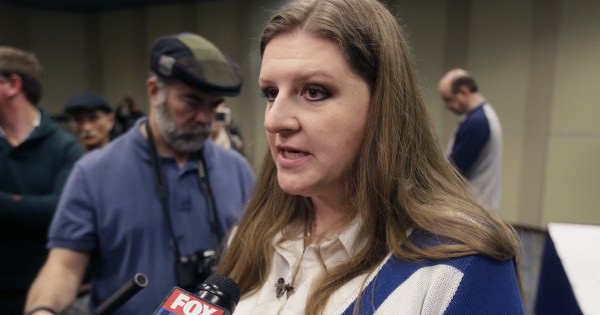Flint Residents Call For End To Outrageous Bills For Water They Can’t Even Use
by Bryce Covert Jan 28, 2016 12:05 pm
Jan 28, 2016 12:05 pm
CREDIT: AP Photo/Carlos Osorio
Melissa Mays, a Flint resident who is demanding an end to bills for contaminated water
Flint residents — who have been struggling with elevated levels of lead in their drinking water ever since the city switched its water source from Detroit to the Flint River in early 2014 — are calling for a moratorium on water bills and the prevention of shutoffs for people who don’t pay.
On Thursday, the advocacy groups Food & Water Watch and Water You Fighting For will deliver petitions with nearly 20,000 signatures to Flint Mayor Karen Weaver, the city administrator, the city chief financial officer, Michigan Gov. Rick Snyder, and Michigan Attorney General Bill Schuette with their demands.
Pat Palmiter is one of the residents struggling both with the contamination issue and the high bills she can’t afford to pay. In December, the estimated bill for her and her husband, both retirees on a fixed income, came to $267.38 — a shock, given that the highest bill they had received before that was about $150, in line with the city’s average. They don’t have the means to pay it since they rely on Social Security and her husband’s pension as their only sources of income. “You can’t afford to be paying money like that,” she said. “There’s no way.”
And it’s not like the couple has been using much water anyway. For over a year they’ve relied on filters and bottled water. They still have to shower in it, though, and she says the water dries out their skin, which is particularly tough for her husband, who has diabetes and already suffers from skin issues.
Palmiter’s hoping that an actual reading of their meter, rather than an estimate, will bring a lower bill. But if that doesn’t happen, she says, “I don’t know what I’m going to do. I can’t pay it all in one payment, for sure.” She was told by the water department that her account is past due although there’s no shutoff notice on it — yet.
Flint’s high water bills — some of the highest in the country — were what first got Food & Water Watch, a group focused on access to water, involved in the issue last March, according to Senior Organizer Lynna Kaucheck. “It wasn’t so much about the safety of the water at that point, it was the cost,” she said.
But then the group eventually learned about the health issues Flint residents were reporting after drinking and cooking with the tap water. “We were like, ‘We have to get involved,’” she said. The group sent nearly 27,000 signatures to the mayor and city administrator at the end of August demanding a switch back to Detroit water.
Now the group is joining with Melissa Mays, a Flint resident who’s long been vocal about the city’s water issues, and her group Water You Fighting For to tackle the billing issue. “If you were subscribing to any service and getting poor service or it wasn’t what you anticipated, you’d stop paying for that,” Kaucheck said. “When it comes to water, something so essential to life…they really should not be forced to pay for something they can’t use.”
There is also a lack of clarity about whether residents face having their water shut off if they can’t or won’t pay their bills. After the city imposed a rapid 35 percent increase in rates in 2011, a judge ruled in August of last year that the increase violated a city law requiring utility hikes to be implemented gradually and halted all shutoffs imposed on any late bills under that rate increase, wiping the slate clean up until September. But once some bills became past due under the reduced rate structure, shutoff notices began going back out in the beginning of December. And many bills are still over $100 a month.
Some people are still reporting shutoff notices, while others say the city has stopped sending them. And no one quite knows whether Flint will follow through and actually disconnect service.
Others are taking action against the city for charging such high rates for water that’s been contaminated for nearly two years. Brenda Williams, an attorney, has filed a class action lawsuit against the city, state, emergency managers, and previous head of the Flint water department Howard Croft demanding that residents be reimbursed for their water bills going back to when the source of the water was first switched. “The complaint is from a contractual standpoint, that you contract with the city to receive water services, quality water,” she said. “When you go to the store and you buy something, you purchase a good or service. If you don’t get the proper goods or goods are defective, you take it back and get a return on your money. In this case, we’re paying for defective water.”
There are a number of other class action lawsuits over the crisis. A different one is also addressing the billing issues, seeking reimbursement for the harm caused by shutoff notices, as well as for the water bills and for the financial damage caused by the water in people’s homes.
Mayor Karen Weaver has already said residents of her city shouldn’t be paying for the contaminated water. And Snyder has set aside $3 million in his budget to go toward relief for residents paying water bills, although it has yet to be determined whether that money will be turned into refunds, forgiveness for past bills, or a reduction of rates in the future. The state House also passed a spending package with $3 million to help the city’s water fund stay solvent despite unpaid bills.
The two groups delivering petitions on Thursday also have an eye to the future, not just an interest in fixing what happened in the past.
A memo the city commissioned in April of 2015 found that water bills are unaffordable across most household sizes, income levels, and usage rates. That same memo laid out a plan to make bills more affordable, which would also bring in more revenue to the water department as residents paid more of their bills and the city spent less on collections, but it was never implemented. “It’s really important moving forward that it’s a system that’s affordable for everybody,” Kaucheck said, suggesting an affordability plan based on income.
Given everything else, the financial toll is just one more piece families are struggling with. “It’s stressful, they have enough to worry about with trying to find safe water, making sure kids are receiving the medical treatment that they need,” Kaucheck said. “We don’t need a long, draw-out plan about how we’re going to do this. It just needs to happen.”
Source: thinkprogress.org





Be the first to comment on "Flint Residents Call for End to Outrageous Bills for Water They Can’t Even Use"